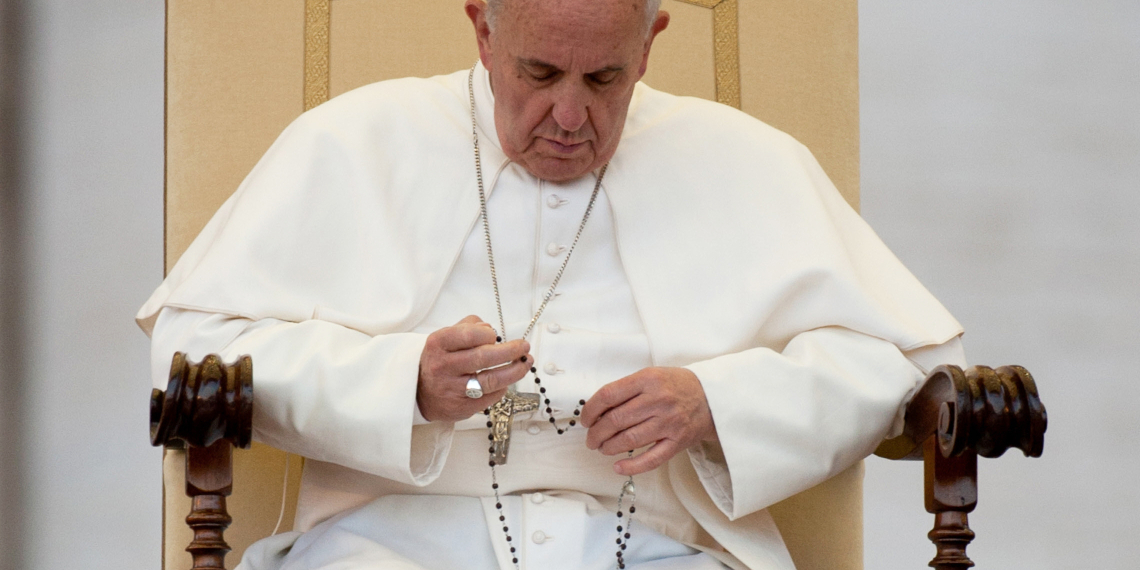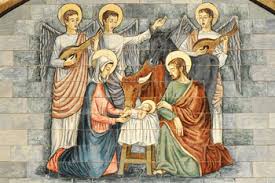
The Joyful Mysteries deal with the Incarnation and infancy of Jesus. They are also prayed, the Luminous Mysteries of the public life of Christ, the Sorrowful Mysteries of the Passion of our Lord and the Glorious Mysteries of the events that occurred after the Resurrection.
"The recitation of the Holy Rosary, with the consideration of the mysteries, the repetition of the Our Father and the Hail Mary, the praises of the Blessed Trinity and the constant invocation of the Mother of God,
is a continuous act of faith, of hope and love, of adoration and reparation."
Josemaría Escrivá de Balaguer.
In the first of the Joyful Mysteries we recall the Annunciation to the Virgin Mary and the Incarnation of the Word.
Benedict XVI says: "In the angel's greeting to the Virgin Mary, he finds in her an attitude of trust, even in difficult moments. A capacity to consider events in the light of faith; a humility that knows how to listen and respond to God with dedication.
With this, the Pope points out, the reason for Mary's rejoicing is reaffirmed: "Joy comes from grace, that is, from communion with God, from having such a vital connection with Him, from being indwelt by the Holy Spirit, totally shaped by God's action."
Mary gives herself with complete trust to the word announced to her by God's messenger and becomes the model and mother of all believers. Faith is, therefore, trust, but it also implies a certain degree of obscurity. Mary opens herself totally to God, she succeeds in accepting the divine will, even if it is mysterious, even if it often does not correspond to her own will and is a sword that pierces the soul."
Benedict XVI points out, "He does not consider it superficially, but pauses and allows it to penetrate his mind and heart in order to understand what the Lord wants of it, the meaning of the proclamation.
The humility of the Virgin Mary, says St. Bernard, is the foundation and guardian of all the virtues. And rightly so, for without humility no virtue is possible in the soul.
All virtues vanish if humility disappears. On the contrary, said St. Francis de Sales, God is such a friend of humility that he immediately goes wherever he sees it.

The same attitude is seen in Virgin Virgin Mary after the worship of the shepherds: "he kept all these things, pondering them in his heart."
"It is the profound humility of Mary's obedient faith, who accepts in herself even what she does not understand of God's work, leaving it to God to open her mind and heart". Hence Elizabeth can say: "Blessed is she who has believed in the fulfillment of the word of the Lord." (Lk 1:45)and that is why it will be called that way for all generations.
Faith tells us, then, that the helpless power of that Child in the end overcomes the rumor of the powers of the world."

In the fourth of the Joyful Mysteries we recall The Presentation in the Temple
Mary no longer appears as impure. She does not go up to the temple to purify herself, but to share in the redemptive journey of Jesus. Mary appears as a collaborator of Jesus, sharing his journey in the service of God's people. She is not an impure woman but a purifier.
Mary's faith, Benedict XVI points out, lives from the joy of the Annunciation, but passes through the mist of her Son's crucifixion, in order to reach the light of the Resurrection.
Therefore, the path of our faith is not substantially different from that of Mary: "We find moments of light, but we also find passages in which God seems absent".
The solution is clear: "The more we open ourselves to God, accept the gift of faith, place our trust totally in Him, as Mary did, the more He enables us, by His presence, to live all situations of life in peace and in the certainty of His fidelity and of His
However, this means going out of ourselves and our own projects, so that the Word of God may be the lamp that guides our thoughts and actions.
When they find the Child in the temple, after three days of searching, he answers them mysteriously: "Why were you looking for me, did you not know that I must be in my Father's house?
So, observes the Pope, "Mary must renew the deep faith with which she said 'yes' at the annunciation; she must accept that precedence belongs to the true and proper Father; she must know how to set free the Son she has begotten to follow his.
My friend: if you want to be big, make yourself small.
To be small requires believing as children believe, loving as children love, abandoning oneself as children abandon themselves, praying as children pray.
And all this together is necessary to put into practice what I am going to discover in these lines:
The beginning of the journey, which ends in complete madness for Jesus, is a trusting love for Mary Most Holy.
-Do you want to love Our Lady? -Well, treat her! How? - By praying Our Lady's Rosary well.
But in the Rosary... we always say the same thing! -And don't those who love each other always say the same thing to each other? Is there not monotony in your Rosary, because instead of uttering words like a man, you utter sounds like an animal, your thoughts being far away from God? -And look: before each decade, the mystery to be contemplated is indicated.
-Have you... have you ever contemplated these mysteries?
Make yourself small. Come with me and - this is the nerve of my confidence - we will live the life of Jesus, Mary and Joseph.
St. Josemaría Escrivá.
With the collaboration of:
OpusDei.org
Meditations on the mysteries of the Holy Rosary, Pope Francis.